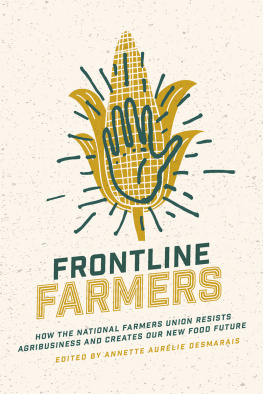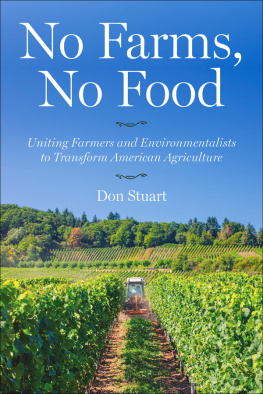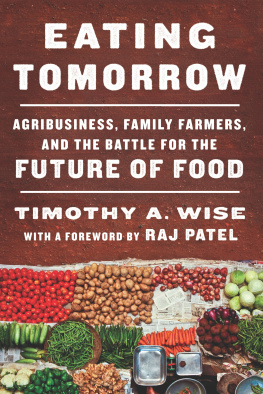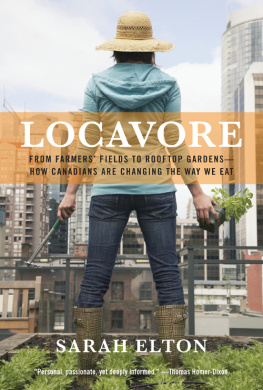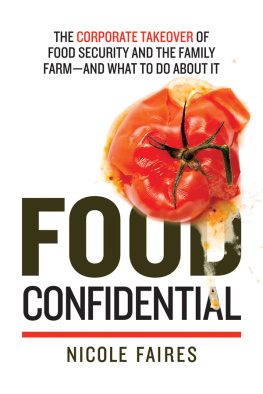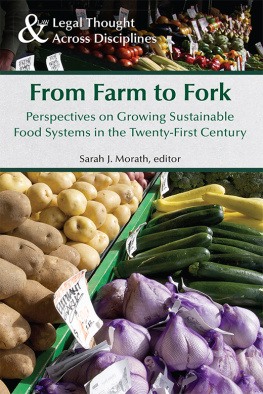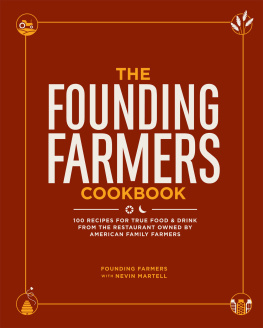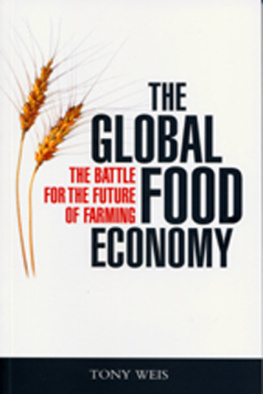Frontline Farmers
Frontline Farmers
How the National Farmers Union Resists Agribusiness and Creates Our Food Future
edited by
Annette Aurlie Desmarais
FERNWOOD PUBLISHING
HALIFAX & WINNIPEG
Copyright 2019 Annette Desmarais
All rights reserved. No part of this book may be reproduced or transmitted in any form by any means without permission in writing from the publisher, except by a reviewer, who may quote brief passages in a review.
Editing: Curran Faris
Cover design: Jess Koroscil
eBook: tikaebooks.com
Printed and bound in Canada
Published by Fernwood Publishing
32 Oceanvista Lane, Black Point, Nova Scotia, B0J 1B0
and 748 Broadway Avenue, Winnipeg, Manitoba, R3G 0X3
www.fernwoodpublishing.ca
Fernwood Publishing Company Limited gratefully acknowledges the financial support of the Government of Canada, the Canada Council for the Arts, the Manitoba Department of Culture, Heritage and Tourism under the Manitoba Publishers Marketing Assistance Program and the Province of Manitoba, through the Book Publishing Tax Credit, for our publishing program. We are pleased to work in partnership with the Province of Nova Scotia to develop and promote our creative industries for the benefit of all Nova Scotians.

Library and Archives Canada Cataloguing in Publication
Title: Frontline farmers: how the National Farmers Union resists agribusiness and creates our new food future / edited by Annette Aurlie Desmarais
Names: Desmarais, Annette Aurelie, editor.
Description: Includes bibliographical references and index.
Identifiers: Canadiana (print) 20190169168 | Canadiana (ebook) 20190169176 | ISBN 9781773631738
(softcover) | ISBN 9781773631745 (EPUB) | ISBN 9781773631752 (Kindle)
Subjects: LCSH: National Farmers Union (Canada)History. | LCSH: FarmersPolitical activityCanada
History.
Classification: LCC HD1486.C3 F76 2019 | DDC 338.106/071dc23
CONTENTS
Interviews with Terry Boehm, Wilfred (Butch) Harder, Pat Mooney,
Karen Pedersen, Ian Robson, Fred Tait and Nettie Wiebe
This work is dedicated to the National Farmers Union:
their courage, hard work, perseverance, political savvy, imagination, laughter, conviviality, activism, and hope for social justice, vibrant rural communities, and a better agriculture. Their stories inspire us all.
Acknowledgements
This book was only made possible with the active participation of the many National Farmers Union ( NFU ) members who shared their precious time, experiences, reflections and wisdom through group interviews. They are the true protagonists of this book.
The other fellow travellers on this journey Id like to acknowledge are the authors of the chapters in this book. This NFU Book Collective, as we called ourselves, was such a pleasure to work with. Their commitment to getting the stories right meant that all members of the collective had to do the research, ask the right questions, frame the conversations, and dig more deeply by going back to the protagonists to engage in even more conversations. I am deeply grateful to each and every one of the authors for their bright minds, camaraderie, generosity, energy, and abundance of organizational and people skills. I also want to acknowledge the three women in the NFU National office Cathy Holtslander, Joan Lange and Bev Magill who responded to numerous calls for information throughout the book project.
Thanks also go to Asha Nelson, who received a University of Manitoba Research Award to spend the summer of 2018 helping me to research and coordinate the work of the NFU Book Collective. A special mention of appreciation goes to Jim Handy for his insightful comments as he read carefully through the various drafts of each and every chapter. I am deeply grateful for your accompaniment throughout this project.
I also want to acknowledge those at Fernwood Publishing who were instrumental in getting this book to print: Wayne Antony for shepherding the whole process from idea to actual words on a page; Curran Faris whose copyediting makes for more smooth reading; and Beverley Rach for dealing with all my production enquiries with such efficiency and grace. I also want to thank others at Fernwood Publishing whose work helped ensure high quality, namely, Jess Koroscil, Brenda Conroy, Debbie Mathers, Nancy Malek, Oyinda Alaka and Johise Namwira.
Finally, I am truly indebted to the NFU for providing me with numerous opportunities to work with so many like-minded agrarian activists who continue to fight the good fight. I have learned so much over my years of collaboration and engagement with the progressive farm movement. With this book, which captures only a small part of the NFU s historical and current struggles, I hope I have given something back.
The Protagonists
A my Goodman, the famous progressive journalist from Democracy Now in the US, reminds us that if we really want to understand what is going on, we need to listen carefully to peoples stories. This unique book collects the stories of some of the National Farmers Union s key struggles over time, told by NFU activists themselves, in their voices. Each chapter focuses on a particular struggle, and by listening to the voices of NFU members, we learn the significance of this struggle, what was at stake and why it matters to the rest of Canadian society. Each of the chapters consists of interviews with two to eight members of the NFU who engage in conversations about key food and agriculture issues and the NFU s strategies and actions, as well as the impact the progressive farm movement has had in efforts to create viable rural communities and socially just and sustainable food systems in Canada.
In this way, the book goes to where the stories are by highlighting the perspectives, analyses and voices of farming people themselves. Let me now introduce you to the key protagonists of the book whose collective experience, activism, knowledge and wisdom are critical to food system transformation.
Terry Boehm is an organic and conventional grain farmer and activist in central Saskatchewan. He graduated at the University of Saskatchewan where he studied history and economics. He grows a diverse mix of eight crops on 4,000 acres. He refuses to grow genetically modified crops, partly because of the gene patents that give corporations power over seeds and farmers. He is a former president, vice president, and board member of the NFU . Terry has served on numerous boards, commissions and cooperatives, including a local co-op retail and farm supply store and the former Saskatchewan Wheat Pool. He vigorously resists the intellectual property mechanisms and legislation that prevent farmers and citizens from exercising their rights to freely save, reuse, sell and exchange seeds. He has analyzed extensively the negative elements of international trade agreements, fought to save the Canadian Wheat Board and continues to work on railway legislation, saving the Canadian Grain Commission and other issues related to agriculture and social justice. Terry has spoken domestically and internationally and is a frequent witness before Parliamentary Committee hearings (Chapters 3 and 4).
Maureen Bostock is a second-generation immigrant who lived on Tsimshian traditional territory in northern BC for twenty-six years, where she came to understand that the fundamental issue facing Canadian society is justice for Indigenous people. When she and her partner Elizabeth moved east and started farming in Balderson, Ontario, she was shocked to learn that the farm was located on unceded Algonquin Territory. With the release of the Truth and Reconciliation Commissions Calls to Action, she started Lanark County Neighbours for Truth & Reconciliation with like-minded Indigenous and non-Indigenous people, working to educate people about the impact of colonialism. In 2018, the Perth Healing Forest Memorial was established to commemorate Residential School Survivors and Missing and Murdered Indigenous Women, Girls and Two-Spirit People. Maureen joined the NFU Indigenous Solidarity Working Group because she believes that farmers need to understand that the land was appropriated if they wish to move forward on a just path (Chapter 12).

